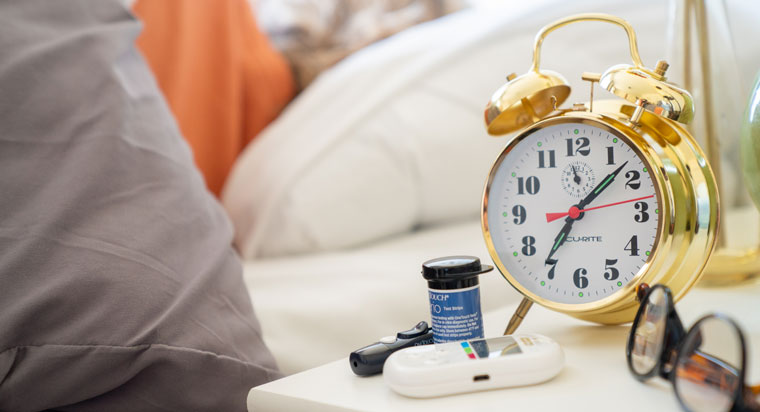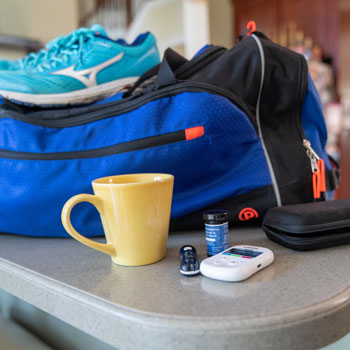When Blood Sugar Rises In the Morning

Answer a few questions and we'll provide you with a list of primary care providers that best fit your needs.
Whether you know it or not, every morning you experience a natural biological event called the dawn phenomenon. For most, this passes without health risk. That’s not the case, however, if you have diabetes.
But to ease your concerns, if you do have diabetes, endocrinologist Miguel Parilo, MD, offers advice on ways to control the effects of dawn phenomenon on your health.
What Is the Dawn Phenomenon?
Dr. Parilo explains that it’s a natural surge of hormones produced by your body – growth hormone, cortisol, adrenaline, and others – typically between 2 and 8 a.m.
People without diabetes can handle this extra hormonal activity. But if you have diabetes, dawn phenomenon can suppress production of the hormone insulin, which is essential for controlling blood sugar. Insulin enables sugar, or glucose, to enter cells to fuel the body.
Dr. Parilo explains how the dawn phenomenon affects someone with diabetes.
Click play to watch the video or read video transcript.
When less insulin enters your bloodstream, the level of sugar in your blood is more likely to rise. About half of people with type 1 and type 2 diabetes experience this morning increase in blood sugar.
About half of people with type 1 and type 2 diabetes experience this morning increase in blood sugar.
What To Do About the Dawn Phenomenon
The dawn phenomenon can be more of a problem if you have type 1 diabetes, in which the body struggles to make enough insulin, compared to type 2 diabetes, the more common form of diabetes, Dr. Parilo says.
 “People with type 2 diabetes can usually do something about it – limit the amount of snacking the night before, reduce carbohydrates to lessen the impact, or reasons, for blood sugar elevation overnight,” he
explains.
“People with type 2 diabetes can usually do something about it – limit the amount of snacking the night before, reduce carbohydrates to lessen the impact, or reasons, for blood sugar elevation overnight,” he
explains.
Dr. Parilo said that a sign that you may need help managing the effects of dawn phenomenon on your diabetes is when, despite positive lifestyle changes that you’ve made, “you’re still noticing this escalation of blood sugar beyond the goals that you and your health care provider have set for you.”
When this happens, he said, your doctor will likely recommend further changes to overcome the effect of the dawn phenomenon. “Perhaps, timing exercise or timing the types of meals or timing your medications to peak or work (in sync with the dawn phenomenon). Then the blood sugar may not escalate to the same extent.”
If you use insulin, he said, “we can change the type, the timing of it, and that can often positively affect the problem.”
Dr. Parilo explains how to reduce the effects of the dawn phenomenon.
Click play to watch the video or read video transcript.
When you have diabetes, monitoring your blood sugar is a must for helping you live with the disease and limit its impact on your well-being. Continuous glucose monitors, available by prescription, can be especially helpful in controlling the effects of dawn phenomenon, Dr. Parilo said.
With this type of monitor, he said, “we can see the tracing of the blood sugar at five-minute intervals. It really nicely demonstrates where the blood sugars are peaking and falling throughout the day.”
Other Causes Of High Morning Blood Sugar
Blood sugar can rise in the morning for reasons other than the dawn phenomenon. Dr. Parilo says these can include:
- "If you go to bed with high blood sugar, there’s a very high likelihood it’s going to linger to the next morning."
- Your diabetes medicines "are not being dosed at the appropriate time, or we’re using medicines that aren’t covering the right hours of the day. The effect isn’t appropriate to control the sugar through the sleeping hours."
- The effect of the body rebounding from low blood sugar – possibly as a result of eating carbohydrates to compensate for the low sugar level – and causing high blood sugar. “That, potentially too, is a cause for morning high blood sugars.”
Dr. Parilo explains when you should see your health care provider for help with the dawn phenomenon.
Click play to watch the video or read video transcript.
In any case, managing diabetes and limiting its negative impact on your health requires a partnership with your health care provider to maintain the right mix of diet, activity, and medicine throughout your day – as well as regularly monitoring your blood sugar levels, Dr. Parilo advises.
Answer a few questions and we'll provide you with a list of primary care providers that best fit your needs.
Sources: Miguel Parilo, MD, Bull Family Diabetes Center; American Diabetes Association; Children’s Diabetes Foundation








